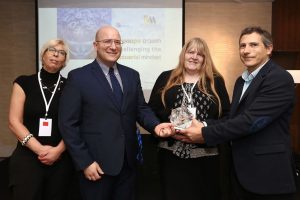This past December, Melissa Boudreau, FCAS, and I had the opportunity to present at the Israel Association of Actuaries (ILAA) seminar, “Changing the Actuarial Mindset.” This participation aligned well with Jim Christie’s 2019 goals for the CAS, specifically goals #4 (Represent the CAS by speaking at events and highlighting that the CAS is the gold standard in educating property and casualty actuaries) and #7 (Continue the CAS tradition of offering assistance and support in the general insurance space to other international actuarial bodies).

The author and Melissa Boudreau, FCAS, accept a commemorative statuette on behalf of the CAS from the Israel Association of Actuaries (ILAA). Pictured from left to right are ILAA President Naama Hashmonai, Charak, Boudreau and ILAA Committee member Emmanuel Barezak.
Our ILAA hosts were very welcoming — from organizing transportation from the airport to hosting a dinner the day before, we truly felt welcome. I met several actuaries with different backgrounds: some who grew up in Israel, some who immigrated to Israel for career opportunities, and some who work in Europe and support the Israeli market.
In my role as the vice chair of the CAS Automated Vehicles Task Force, I appreciated the opportunity to speak to this audience because I enjoy presenting on this topic. At my presentations, the questions I receive and conversations that ensue are always interesting. One such conversation at the ILAA seminar explored ways to assess auto risk by traffic routes. One suggestion was to use autonomous vehicle technology to direct vehicles to less congested and risky roads. This type of outside-the-box thinking could eventually create new fleet management tools or even new variables in pricing models.
When attending other ILAA sessions, I also appreciated hearing from life insurers and other insurance professionals who are not part of the CAS. In a session led by Alan Martin called “Modifiable Risk: Changing How We Assess Risk to Provide Fairer More Inclusive Products,” Martin spoke about how P&C insurers often re-underwrite accounts and that life insurers generally do not. He had a proposal to create incentives/penalties to get insureds to make healthy life choices so that they can lower their risk. It seems like an obvious change, but it is not how term-life (or other life products) generally operate. This session and discussion demonstrate the need for robust conversations with people outside our practice areas. My takeaway was a reminder that innovation does not need to be complex to be beneficial.
Being invited to present in Israel is fully due to my CAS volunteer work. Being part of a large professional organization dedicated to the property and casualty space means that we can lead research into areas that other actuarial bodies do not have the capacity to. I encourage more CAS members to volunteer for the CAS and push the boundaries of their actuarial knowledge. There are always opportunities to contribute and present at both CAS and international meetings. To see these opportunities, visit https://www.casact.org/community/volunteer/.


